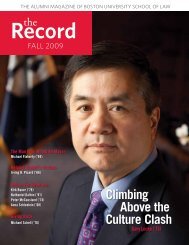the nature of representation: the cherokee right ... - Boston University
the nature of representation: the cherokee right ... - Boston University
the nature of representation: the cherokee right ... - Boston University
Create successful ePaper yourself
Turn your PDF publications into a flip-book with our unique Google optimized e-Paper software.
2005] THE NATURE OF REPRESENTATION 137<br />
concerned, “if it was unauthorized, any inquiry into its terms was unnecessary.” 240<br />
An argument relying on Cherokee criticism <strong>of</strong> <strong>the</strong> Treaty <strong>of</strong> New Echota alone<br />
would probably not be fatal for <strong>the</strong> delegate <strong>right</strong>. Elias Boudinot’s biographer<br />
accurately explained Cherokee criticism in <strong>the</strong> immediate removal era: “The<br />
Cherokees could not believe that <strong>the</strong> United States would enforce against <strong>the</strong>m a<br />
treaty which <strong>the</strong>y had never made and against which <strong>the</strong>y had never ceased to<br />
protest.” 241 Ross’s stance against <strong>the</strong> Treaty and criticisms <strong>of</strong> <strong>the</strong> Treaty must be<br />
understood as coming out <strong>of</strong> this high stakes and emotional period. By 1842, after<br />
<strong>the</strong> trauma <strong>of</strong> removal, Ross was careful to state that <strong>the</strong> Cherokees did not seek to<br />
annul <strong>the</strong> Treaty <strong>of</strong> New Echota:<br />
However, it will be proper as you have referred to <strong>the</strong> “New Echota treaty <strong>of</strong><br />
1835” in a manner seemingly to justify an inference that No New Treaty<br />
would be acceptable to us unless that <strong>of</strong> 1835 should be specially “annulled”<br />
or “declared void.” We must remind you that in all our conferences we have<br />
not asked that this should be done. We have not proposed <strong>the</strong> repudiation in<br />
terms <strong>of</strong> that instrument as one <strong>of</strong> <strong>the</strong> conditions <strong>of</strong> this Negotiation. We<br />
spoke <strong>of</strong> our grievances and complained <strong>of</strong> wrongs, and much <strong>of</strong> <strong>the</strong>se it is<br />
most true had <strong>the</strong>ir origin in that “treaty,” but we have only sought that <strong>the</strong>se<br />
evils be properly remedied by a new arrangement without any invidious or<br />
repudiating reference to that or any o<strong>the</strong>r treaty or past public transaction. 242<br />
Ross’s 1842 position broke from his earlier stance that <strong>the</strong> Cherokees “reject[ed]<br />
all [<strong>the</strong> Treaty’s] terms [and] . . . will receive none <strong>of</strong> its benefits.” 243<br />
A position backing even a “false” treaty, especially where one party <strong>the</strong>reto later<br />
accepts <strong>the</strong> treaty, can make such a treaty <strong>the</strong> law <strong>of</strong> <strong>the</strong> land. Federal Indian law is<br />
based upon a series <strong>of</strong> rules denying Indians an equal place among <strong>the</strong> Anglo<br />
humanity based on racist ideas and legalized oppression. 244 Yet, <strong>the</strong>se rules are law.<br />
Arguably a similar thing has occurred with <strong>the</strong> Treaty <strong>of</strong> New Echota. Though<br />
protested and even denied by Cherokee leaders, after Senate ratification Cherokee<br />
effortsatdenialdidnotde-obligate <strong>the</strong> U.S. from <strong>the</strong> terms <strong>of</strong> <strong>the</strong> Treaty. Thus,<br />
without being perverse, one can simultaneously state that <strong>the</strong> delegate <strong>right</strong> exists<br />
still today and that “[t]he treaty was no treaty. The evidence is conclusive.” 245<br />
240<br />
Id.<br />
241 GABRIEL, supra note 13, at 155.<br />
242 Letter from John Ross, W. Shorey Coodey, John Benge, D. Carter, and Jesse<br />
Bushyhead to John C. Spencer (Aug. 12, 1842), in 2THE PAPERS OF CHIEF JOHN ROSS,<br />
supra note 14, at 145.<br />
243 Memorial from John Ross, R. Taylor, Edward Gunter, James Brown, Elijah Hicks,<br />
Samuel Gunter, Situwakee, and White Path to <strong>the</strong> U.S. Senate and House <strong>of</strong><br />
Representatives (Dec. 15, 1837), in 1THE PAPERS OF CHIEF JOHN ROSS, supra note 14, at<br />
569.<br />
244 See e.g., ROBERT A. WILLIAMS, JR., THE AMERICAN INDIAN IN WESTERN LEGAL<br />
THOUGHT: THE DISCOURSES OF CONQUEST (1990); Johnson v. McIntosh, 21 U.S. (8<br />
Wheat.) 543 (1823).<br />
245 THOMAS VALENTINE PARKER, CHEROKEE INDIANS WITH SPECIAL REFERENCE TO THEIR









